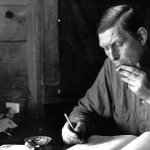Oh, a dainty plant is the Ivy green,
That creepeth o’er ruins old!
Of right choice food are his meals, I ween,
In his cell so lone and cold.
The wall must be crumbled, the stone decayed,
To pleasure his dainty whim:
And the mouldering dust that years have made
Is a merry meal for him.
Creeping where no life is seen,
A rare old plant is the Ivy green.
Fast he stealeth on, though he wears no wings,
And a staunch old heart has he.
How closely he twineth, how tight he clings,
To his friend the huge Oak Tree!
And slily he traileth along the ground,
And his leaves he gently waves,
As he joyously hugs and crawleth round
The rich mould of dead men’s graves.
Creeping where grim death has been,
A rare old plant is the Ivy green.
Whole ages have fled and their works decayed,
And nations have scattered been;
But the stout old Ivy shall never fade,
From its hale and hearty green.
The brave old plant, in its lonely days,
Shall fatten upon the past:
For the stateliest building man can raise,
Is the Ivy’s food at last.
Creeping on, where time has been,
A rare old plant is the Ivy green.




















Comment form: